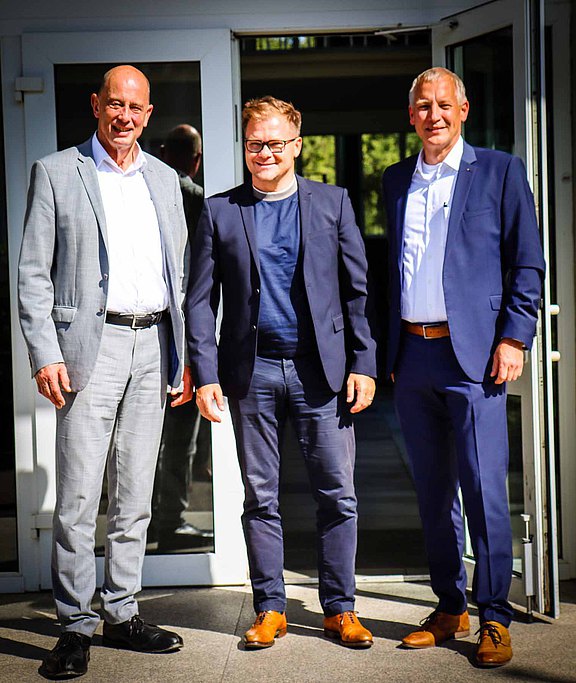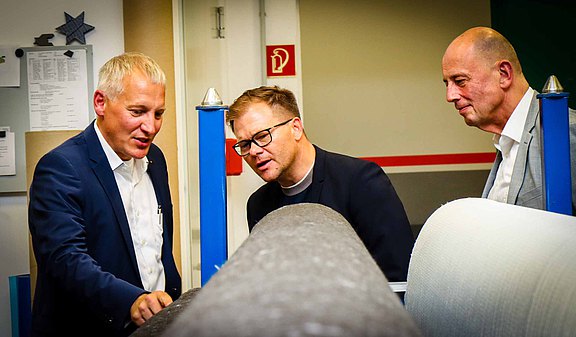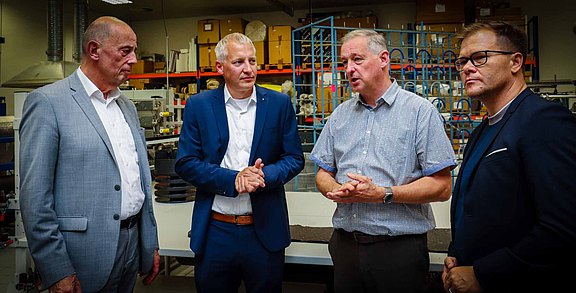Carsten Schneider, Minister of State to the Federal Chancellor and Federal Government Commissioner for Eastern Germany, was a guest at TITK on August 26, 2024, together with Thuringia's Minister of Economics and Science Wolfgang Tiefensee. The main topic of the discussion with Institute Director Benjamin Redlingshöfer: if technological change is to succeed, reliable framework conditions are needed from politicians.
Despite his delight at the high-ranking visit from Berlin and Erfurt, the TITK Director also took the opportunity to address clear words to the Federal Government. In recent weeks and months, there have been very unclear signals from Berlin regarding the future of proven funding instruments. Redlingshöfer noted that the Central Innovation Program for SMEs (ZIM) has experienced a veritable rollercoaster ride. Small and medium-sized enterprises without their own capacities for research and development can, for example, enter into a partnership with business-related research institutions or innovation networks. “First the application capacity for companies was restricted, then it was increased again, but at the same time additional conditions were imposed, which increases the bureaucratic burden again,” criticized Redlingshöfer. And now, according to the federal government's draft budget, ZIM funding for 2025 is to be cut by almost a fifth. “It is also important to ensure a smooth and seamless transition between the ZIM guideline, which expires at the end of the year, and the new guideline from 2025,” Redlingshöfer continued.
Also in terms of the Technology Transfer Program for Lightweight Construction, in which the TITK was particularly involved, also received bad news at the end of 2023 that the program would be discontinued or at least suspended. “Almost overnight, it was no longer possible to submit an application,” says Redlingshöfer. This approach unsettled everyone involved - both the companies and the research institutions. “We understand that the budget is limited. However, good communication is important for the acceptance of such measures so as not to offend the players in this important field of technology.”
Last but not least, the plans for the new German Agency for Transfer and Innovation (DATI) remain under criticism. The expertise of application-oriented research institutes has hardly been included here to date. In a position paper, the Konrad Zuse Industrial Research Association and various state research associations are therefore calling for more transparency in DATI's processes and greater openness towards stakeholders. This is because universities of applied sciences are currently given clear preference when it comes to appointments to committees.
Benjamin Redlingshöfer thanked Carsten Schneider for his commitment to advocate for the issues raised with the coalition partners in Berlin. He also thanked Wolfgang Tiefensee for his support of the new DICE innovation center, which will now been launched at TITK with the help of GRW and FTI funding.
At the end of the visit, the guests took a tour of Technika and saw, among other things, a new pilot plant for thermoplastic unidirectionally reinforced tapes. It completes the entire research value chain on lightweight construction that TITK and the Thuringian Innovation Center for Mobility (ThIMo) as well as the Department of Plastics Technology at Ilmenau University of Technology (CTI) have jointly established. This enables the production of semi-finished products with low weight but high stability, which are used in demanding applications in the automotive sector, aviation or shipping. Fiber-reinforced pressure vessels and pipes for the hydrogen economy are also the focus of developments.


